2025 Alternatives Summit: Navigating a World in Flux
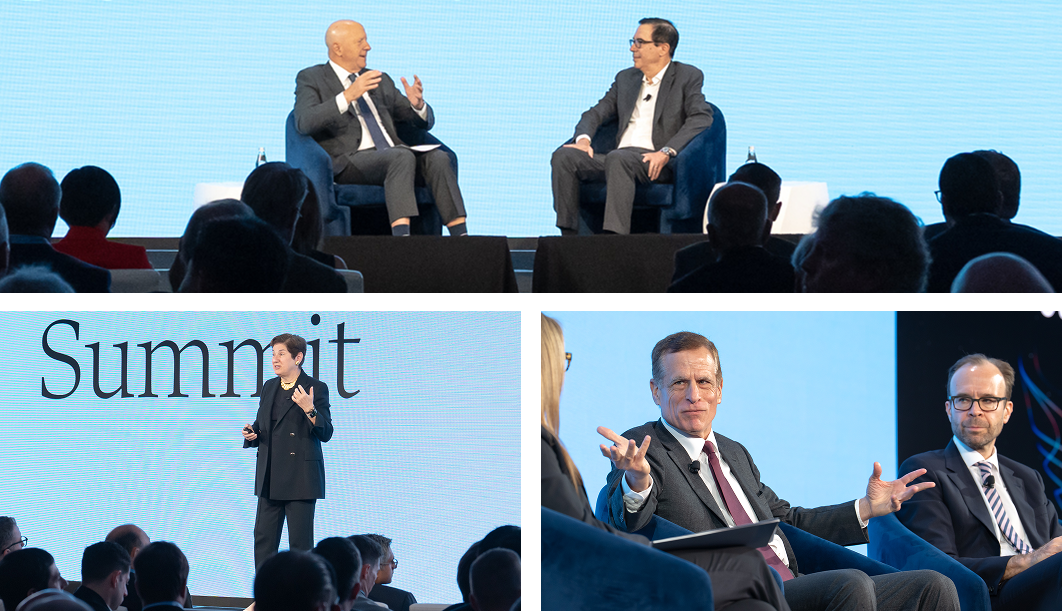
US Preeminence
The summit opened with a deep dive into the global macroeconomic and geopolitical landscape. In a conversation with David Solomon, Chairman & CEO of Goldman Sachs, Steven Mnuchin, 77th US Secretary of the Treasury and Founder & Managing Partner of Liberty Strategic Capital, underscored the broad resilience of the US economy, despite a recent slowdown in employment growth. An AI-related capex boom is fueling near-term growth in data centers, power consumption, and job creation. The budget deficit, enlarged due to excessive post-COVID spending and political resistance to spending cuts, is a key risk, and the debt-to-GDP ratio may become a bigger concern if US GDP does not grow at 3% per annum.
Jan Hatzius, Chief Economist & Head of Global Investment Research at Goldman Sachs, and Rob Kaplan, Vice Chairman at Goldman Sachs and former President of the Federal Reserve Bank of Dallas, provided a 360° outlook on global macro trends. They noted that headline US GDP has been distorted by front-loaded spending and inventory swings, with demand and labor indicators pointing to slower, but still positive, growth. Concerns from a prolonged US government shutdown include the loss of timely economic data, impairing Fed and investor decision-making and increasing the risk of policy errors and market volatility. Both believe there is potential for further US rate cuts in 2026, following cuts in the final stages of 2025. They highlighted substantial disinflation from 2021–22 peaks but cautioned that the US economy is not "out of the woods" regarding inflation.
Sharmin Mossavar-Rahmani, Head of Investment Strategy Group & Chief Investment Officer of Asset & Wealth Management at Goldman Sachs, reinforced the notion of US pre-eminence, arguing it remains intact and is unlikely to be impacted by political shifts. She emphasized the gap between the US and other developed and emerging market countries continues to widen across most metrics—no other countries are likely to catch up. Despite short-term noise, it’s key to maintain perspective, separate the signals from the noise, and ultimately stay invested in US assets.
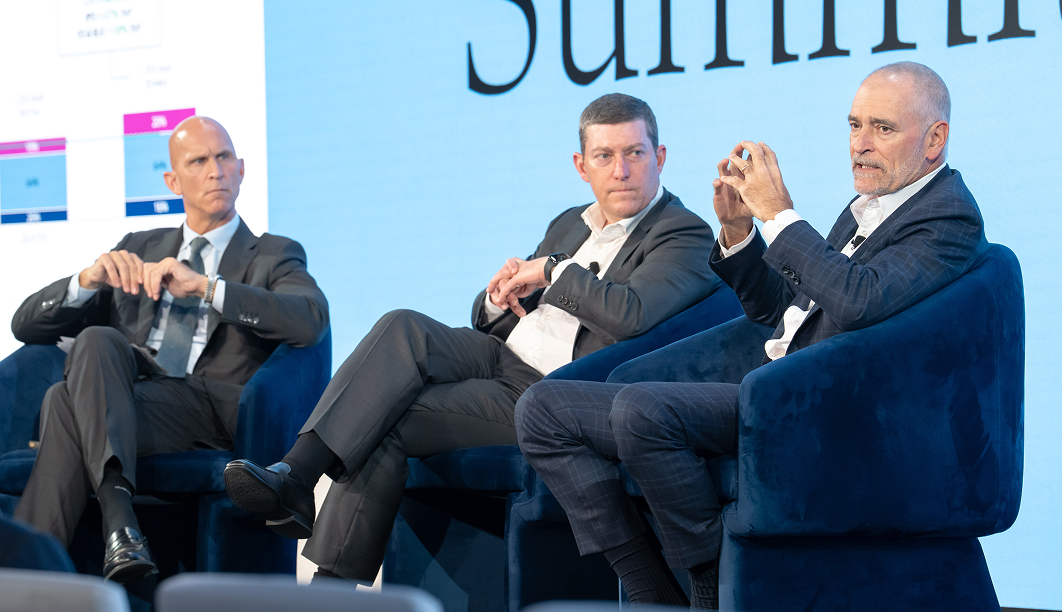
Dealmaking Momentum
Adding to the forward-looking perspective, Tim Ingrassia, Co-Chairman of Global Mergers & Acquisitions at Goldman Sachs, and David Ludwig, Global Head of Equity Capital Markets, Capital Solutions Group, Goldman Sachs, provided an optimistic outlook for dealmaking, with 2025 corporate M&A volumes expected to match those of 2021. The IPO market, which is highly cyclical, has shown significant recovery in 2025, despite earlier tariff impacts and elevated uncertainty. While elevated valuations and the rapid shifts in market sentiment remain top concerns, the overall sentiment points towards a robust period for both M&A and IPOs, driven by factors such as normalizing monetary policy, technological disruption, and a focus from CEOs on strategic growth.
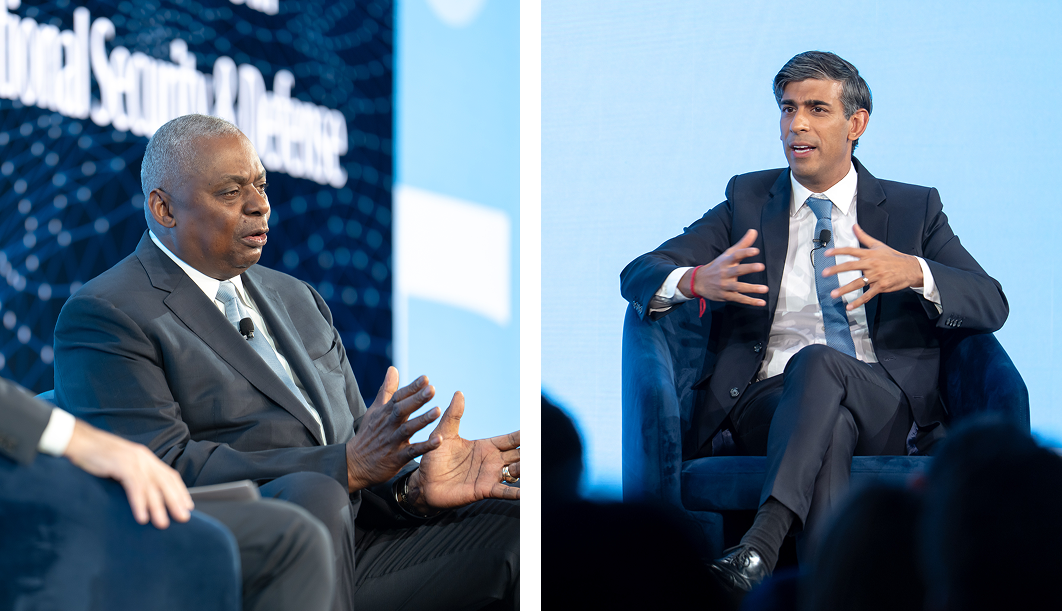
Geopolitics
The geopolitical landscape was a central theme. Rishi Sunak, Senior Advisor at Goldman Sachs and former Prime Minister of the United Kingdom, described the next decade as the most dangerous and transformational of our lifetime. He highlighted a shift from a unipolar to a volatile multipolar order, marked by rising coordination among authoritarian regimes and intensifying US–China competition. Sunak also pointed to Europe's deep structural challenges, including economic stagnation, fragmented capital markets, and lagging innovation, compounded by political instability and migration pressures. He noted that trade tensions and tariffs predate the current US administration, predicting no near-term tariff removal by the President.
Secretary Lloyd Austin, US Secretary of Defense (2021–2025), emphasized a strategic focus on China as the principal “pacing challenge” for the US. He stressed the importance of deterrence and coalition building in the Indo-Pacific, particularly given the global economic importance of the Taiwan Strait. Austin also highlighted the need for strengthening military-to-military communications with both allies and adversaries, balancing clear red lines with civility. Regarding Russia’s invasion of Ukraine, he underscored the shortcomings of the Russian military and the determination of the Ukrainian people, stressing the vital role of continued coordinated military and security assistance from the US and allied countries.
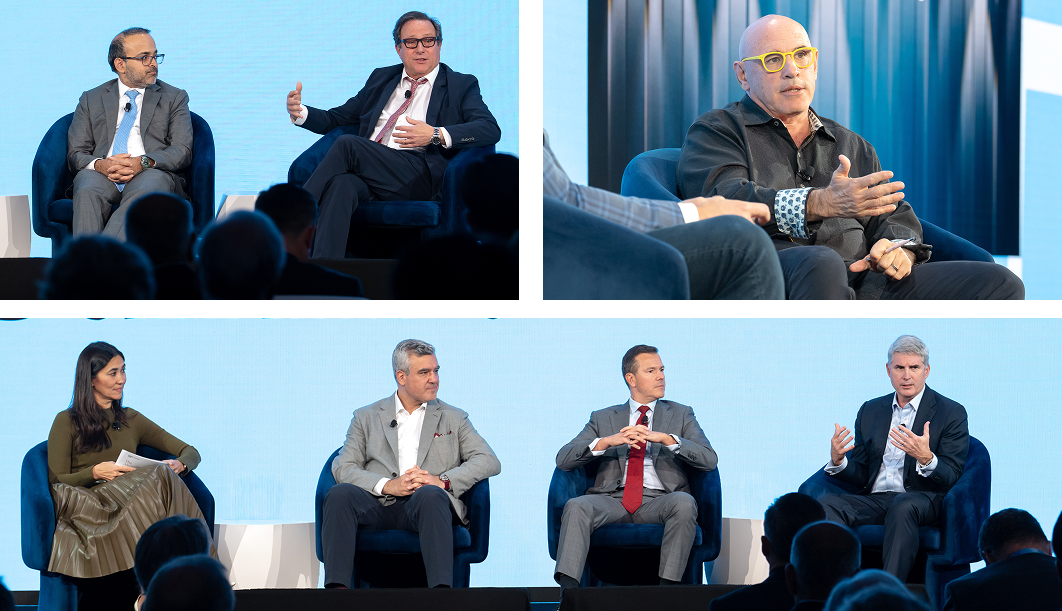
Private Market Opportunities
Private credit was a significant discussion point. Glenn August, Founder & CEO, Oak Hill Advisors and Vivek Bantwal, Global Co-Head, Private Credit, Goldman Sachs countered negative headlines on the asset class, asserting that credit market fundamentals remain healthy, though rigorous diligence and sound underwriting are crucial for investors. In a session moderated by Stephanie Rader, Global Co-Head, Alternatives Capital Formation, Goldman Sachs, both speakers also advocated active management and a partnership-driven model in private credit.
Goldman Sachs Asset Management’s Harold Hope, James Reynolds, and Ali Raissi-Dehkordy discussed unlocking private market liquidity. Despite rising private markets liquidity and alternatives AUM, 2024 saw record low distributions. GP and LP-led secondary transactions have surged due to market expansion, liquidity innovation, and specialization. Investors aren't exiting but lack capital for large deals, creating secondary investment opportunities. Meanwhile, diversified private credit exposure, including energy transition and infrastructure, offers long-term income potential.
Private equity industry leaders Jonathan Sokoloff, Managing Partner at Leanard Green & Partners, and Nate Sleeper, CEO of CD&R, were joined in a discussion with Stephanie Hui, Head of Asia Pacific Private Investing & Co-Chief Investment Officer, Growth at Goldman Sachs. The conversation, moderated by Michael Brandmeyer, Global Head & Chief Investment Officer, External Investing Group at Goldman Sachs, highlighted that activity is stabilizing even as exits remain the industry’s primary bottleneck. The industry's shift from multiple expansion to operational value creation through margin expansion, return on equity improvement, and organic/inorganic growth was another key theme.
Goldman Sachs Asset Management’s Michael Bruun, Lou D’Ambrosio and Darius Adamczyk emphasized agentic AI as the biggest value creation unlock. However, it’s important to focus on impact over hype, learn relentlessly, recognize data's crucial role, and embrace AI as a shared responsibility. Dennis Walsh, Global Co-Head, Quantitative Investment Strategies (QIS), Goldman Sachs, highlighted AI’s role in quantitative strategies, noting the ability of techniques analyze management sentiment for ambiguity, emotion, and evasiveness.
Rob Citrone, Principal & Founder, Discovery Capital Management, discussed generating alpha via hedge funds, noting policy shifts and volatility create new market opportunities, with global investors overweighting the US. Post-COVID, diversified portfolios are key, a role hedge funds can fill, particularly on the short side. He believes US tech exceptionalism is priced in. He identified emerging markets, especially Latin America (Mexico & Argentina), as a major opportunity due to regime change, market liberalization, and improving monetary policy.
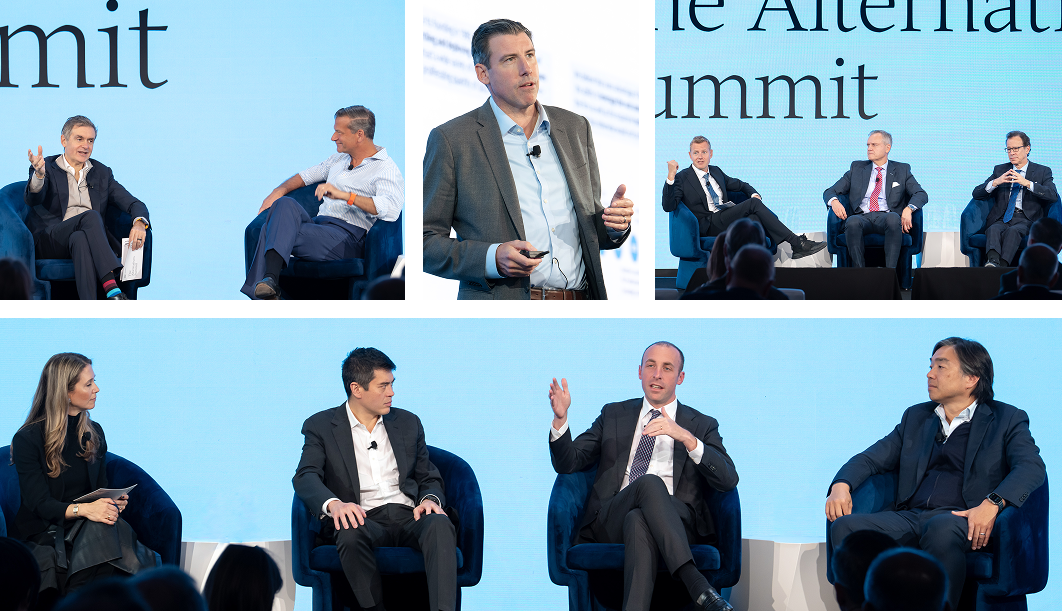
AI and Infrastructure
Goldman Sachs' internal AI strategy focuses on efficiency, client experience, and growth. More broadly, Goldman Sachs’ George Lee and Marco Argenti highlighted unprecedented consumer adoption of AI. They posited that individuals adept at overseeing human and AI agents will create significant "individual alpha" in the evolving workforce.
Goldman Sachs’ Jung Min, Jason Tofsky, and Len Seevers discussed AI's infrastructure demands. Len Seevers argued against an AI bubble, viewing the significant level of capital deployment as potentially sustainable for 3-5 years, supported by use cases and demand pipelines. Jung Min agreed, calling it an "AI headlines bubble," not a fundamental one. Power availability acts as a natural market check. A shift to "sovereign AI" is occurring, with the Middle East and Asia emerging as key regions for domestic AI capabilities.
Alternative Viewpoints
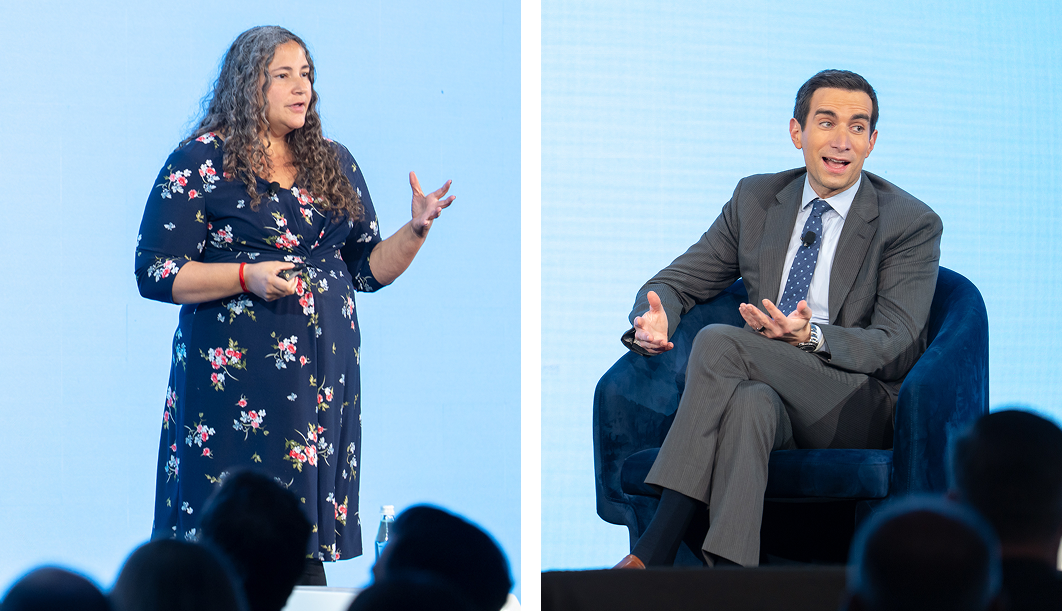
Andrew Ross Sorkin, author and co-anchor of CNBC’s “Squawk Box” discussed his new book focused on the 1929 Wall Street crash, emphasizing the human element in economic crises. He noted leverage as a systemic risk multiplier, advocating humility in assessing its location and underscoring transparency and accountability for navigating markets more effectively. He also highlighted the importance of the Fed’s independence.
Dr. Laurie Santos, Yale Cognitive Scientist, presented "The Science of Health & Happiness," outlining five paths to greater happiness: prioritizing happiness for better performance; fostering social connections; practicing present-moment savoring (e.g., meditation); motivating with self-compassion (mindfulness, common humanity, self-kindness); and loving work by focusing on strengths. She introduced the R.A.I.N. Method for negative emotions: Recognize, Allow, Investigate, and Nurture with self-compassion.
Capitalizing on Opportunities in a World in Flux
The 2025 Alternatives Summit presented a comprehensive view of a world in flux, marked by headwinds but also significant opportunities. Discussions highlighted the US economy's resilience, AI's transformative power, and the evolving alternatives investment landscape, emphasizing the need for discipline, selectivity, adaptability, strategic foresight, and a nuanced understanding of global trends. Diverse perspectives from investment leaders and influential figures reinforced the importance of integrating economic realities, geopolitical shifts, technological advancements, and the human element.
